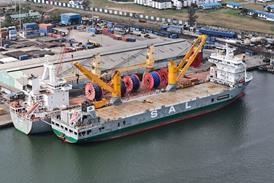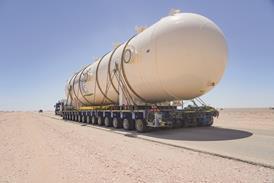February 16 - The International Federation of Freight Forwarders Associations (FIATA), the umbrella organisation for global freight forwarder associations, has commented on the value of free trade, trade facilitation, and trade development in the wake of
In a statement on its website FIATA highlights the fundamental role played by international trade as "the building block of the development and prosperity of each state and nation in the world today."
FIATA says it stands together with its over 40,000 members, who are rooted in the tradition of free trade and open to the world economic order.
It says the freight forwarding companies it represents are able to think of supply and demand in a holistic manner, responsive to the fact that supply chains do not stop at national or regional borders and rarely use one mode of transport only.
"The forwarding industry is constantly evolving and adapting in order to organise efficient, effective and timely multimodal door-to-door transportation and to help secure sufficiently large flows of freight by eyeing smart, seamless networks of interconnected corridors and hubs supporting advanced services.
"The freight forwarders services are the backbone of international trade and make it conceivable. Over the years the industry has learned to think out of the box and adapt to challenging forces that range from shifting demand patterns, more complex and global sourcing, changing relationships with shippers, telecommunication and electronic data processing."
FIATA says that based on the industry's resilience there is no requirement of additional regulation at international level, while the top intervention areas that would offer a development dividend for all countries are infrastructure policy, research, education and awareness.
In what might be seen as a thinly disguised comment on what lies behind Brexit and the recent election in the USA, FIATA adds that politicians should not use a short-sighted approach to decision making. "Losing faith in international cooperation leads to futile contemplation and sterile firefighting from one insurgence to another. In the end social unrest prevails and this could jeopardise peace."
It sees the role of governments as cutting red tape and creating facilitation opportunities, enhancing harmonisation, implementing international agreements, investing in education, promoting skills' creation and quality of study, updating, upgrading and maintaining infrastructure, promoting public and private investment in key infrastructure and seeking international coordination, not regional segregation.
It says that as it tries to promote the World Trade Organization (WTO) Trade Facilitation Agreement (TFA) which is now coming into force. Forwarders require better data management to provide end‐to‐end visibility of manufacturing capacity, inventory holdings, transport availability and all the necessary metrics on a global visibility scheme. Thus, more cross border continuity and reliability within the supply chain is required through facilitation tools such a Single Window for Customs, which can be conceived as a strong enabler of better trade. FIATA has been in the front line to promote the TFA both globally and at a national level.
It concludes that today, freight forwarders stand for a trade policy that focusses on sustainable development and prosperity. Progress translates into investing in infrastructure and trade facilitation instruments, with a view to ensuring sustainable services with logistics connectivity and reduction of trade transaction costs, refuting protectionism as it is dangerous to development.
Policies should experience a paradigm shift from control to trust-based regulation, a paradigm where freight forwarders are at shippers' service with expertise, information and organisation, helping them to uphold compliance and sustainability, involving all the stakeholders in the supply chain.
www.fiata.com
















